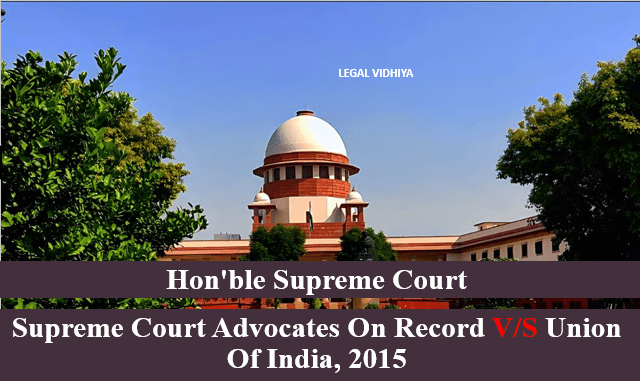
| Citation | AIR 2015 SC 5457 |
| Date of Judgement | 16 October, 2015 |
| Court | Supreme Court of India |
| Case Type | Rule of Law |
| Appellant | Supreme Court Advocates on Record Associations |
| Respondent | Union of India |
| Bench | Justice Jagdish Singh Khehar, Justice Chelameswar, Justice Madan B Lokur, Justice Kurian Joseph, Justice Adarsh Kumar Goel |
| Referred | Constitution of India |
Facts of the Case
The case of S.P. Gupta was overruled by the nine-judges bench and also devised a specific procedure for appointment of judges in the Supreme Court in the interest of “protecting the integrity and guarding the independence of Judiciary”. For the same reason the primacy of the Chief justice of India was held to be essential. A writ petition was filed in the Supreme Court by the Supreme Court Advocates on record and senior advocates by challenging the constitutionality of the 99th amendment and the NJAC Act 24 as this petition alleged that the basic structure of the Constitution is violated by the NJAC by compromising Judiciary’s independence. By the majority of the verdict the powers of CJI over transfer and judicial appointment were given back.
Issues
Issues raised in the court of law were as follows:-
- Whether the 99th amendment act, 2014 was constitutionally valid?
- Whether NJAC Act, 2014 are violative of separation of powers or not?
Arguments
Appellant argued that the executive must separate from the functioning of the judiciary of Article 50 of the Constitution. The ignorance shall not be furthermore taken for the minimization in interference of executive in judiciary appointment and the recommendation of CJI, Article 124 and 217 has made the Chief Justice of NJAC more responsible.
On the other hand, the respondent argued by filing a petition in the court asking the validity of two precedents which are directly relevant to the case. It was contended that the structure of the constitution is preserved by the impugned provisions. The appointment of higher judiciary will only be done when a candidate is recommended by five of six members of NJAC Commission. The Constitution has granted a greater autonomy to the President in the appointing process.
Judgement
Thus, question on the primacy the court concludes that the role of Chief Justice of India in the matter of appointment of judges of the Supreme Court is unique, singular and primal. The Supreme Court with a ratio of 4:1 gave the judgement in favor of petitioners and held that Article 124A is the most important Article of the 99th amendment. The appointment of judges to the Supreme Court under Article 124(2), the Chief Justice of India should consult the four senior most judges who form the collegium. The President should appoint the judges according to the recommendation made by the collegium. The appointment of judges can be challenged only on the ground that the consultation power has not been in conformity with the guidelines.
References
https://blog.ipleaders.in/supreme-court-advocates-on-record-association-vs-union-of-india/
https://lawfoyer.in/supreme-court-advocates-on-record-association-vs-union-of-india/
Written by Nehal Soni from BM Law College, Jodhpur, an intern under Legal Vidhiya.
Disclaimer: The materials provided herein are intended solely for informational purposes. Accessing or using the site or the materials does not establish an attorney-client relationship. The information presented on this site is not to be construed as legal or professional advice, and it should not be relied upon for such purposes or used as a substitute for advice from a licensed attorney in your state. Additionally, the viewpoint presented by the author is of a personal nature.




0 Comments